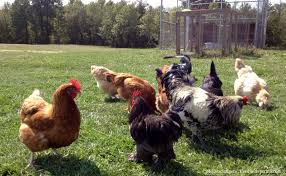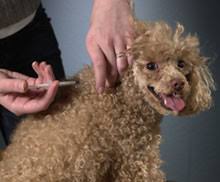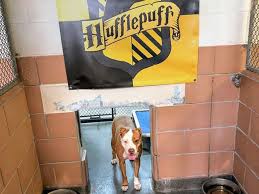Chickens As Pets
Kathy Shea Mormino, The Chicken Chick's Guide To Backyard Chickens
 The "Chicken Chick" is back with her backyard chicken stories and tips on raising your own chickens. Trained as a lawyer, Kathy Shea-Mormino is taking on cities all across the U.S. to allow chickens in city settings.
The "Chicken Chick" is back with her backyard chicken stories and tips on raising your own chickens. Trained as a lawyer, Kathy Shea-Mormino is taking on cities all across the U.S. to allow chickens in city settings.
Two years ago we interviewed Kathy Shea-Mormino, the Chicken Chick, regarding litigation at that time about not permitting people to have chickens. She now has a brand new book out called The Chicken Chick's Guide To Backyard Chickens.
Previously in Kathy's farm town, raising backyard chickens was not a permitted activity. There was even a lawsuit by the town against her and her husband, which they prevailed on. Kathy then went on to subsequently get the law changed in her town so that if you have a quarter acre of land you can keep chickens.
While Kathy prevailed in her hometown, she explains that there are municipalities all over the country where backyard chickens are not legal to be kept. She says it sounds crazy because it is crazy. Zoning regulations were not fashioned to protect people from rogue chickens. They were fashioned to protect housing values from commercial endeavors like glue factories.
So if chickens are legal, what about roosters? Are they still banned in backyards? Kathy tells us it varies by jurisdiction. In her mind there is no there's no difference between noise that comes from a dog or an airplane or a rooster. She says noise is noise. Her position is if jurisdictions want to regulate noise they should so based on decibels, or time of day, or what have you, because there's no difference between the types of noise. Noise is noise.
Of course, we all know that roosters crow because they have internal clock that helps them anticipate sunrise. Roosters crow but don't dogs bark? Absolutely! Some dogs bark first thing in the morning and bark constantly throughout the day. In Kathy's experience, dogs are much more noisy and persistently noisy throughout the day than roosters. A rooster will crow a couple of times and then generally stop. They're different; each rooster is an individual; each dog is an individual, but on average she thinks dogs are much more annoying to neighbors than the average rooster. In fact, she's yet to meet anyone who didn't have the sentiment that they would prefer to live next door to a rooster than a barking dog.
So how fast is the backyard chicken as pets movement going? Kathy doesn't like the concept of claiming that it's a movement. To her it is a very traditional and customary endeavor to raise chickens in your backyard for eggs. That's how people in the beginning of the twentieth century got eggs. There were no grocery stores. There were no commercial poultry farms. If you wanted eggs or you wanted chickens for meat, then you raised the birds. The pendulum swung far away in the opposite direction after the two world wars and people started moving into the cities and it wasn't posh to do that. Then commercial meat operations set up shop. Next we could buy meat and eggs in grocery stores.
 The backyard chicken of today is more than just an egg layer. They have become pets and family members, which is a surprise to most of us. Kathy first obtained her chickens because she wanted fresh eggs and her neighbor was doing it. It just looked like an attainable objective. What she didn't expect was that as soon as she brought the baby chicks home that they would become pets. She thinks it's a surprise to most of us. She doesn't think most backyard chicken keepers expect that their chickens are going to become pets, but they do.
The backyard chicken of today is more than just an egg layer. They have become pets and family members, which is a surprise to most of us. Kathy first obtained her chickens because she wanted fresh eggs and her neighbor was doing it. It just looked like an attainable objective. What she didn't expect was that as soon as she brought the baby chicks home that they would become pets. She thinks it's a surprise to most of us. She doesn't think most backyard chicken keepers expect that their chickens are going to become pets, but they do.
Chickens have their own personalities, says Kathy. It's rather unexpected because you don't think of chickens as personable or entertaining or amusing, but they really are. They're not very different from a dog or a cat, except in that they produce food for you. What does your cat or dog produce? Chickens are pets with actual benefit.
Kathy has around 50 chickens, give or take. In her mind she was going to start with six. In reality, she ended up starting with 14 and then it just grew from there. She then started hatching eggs and ordering different breeds for the different colors and the different plumage colors as well as the different personalities and characteristics.
What are some of the best chicken breeds for someone looking to raise backyard chickens? Kathy states it depends what your needs are. So what's best for her may not be best for you. If you live in Canada, the birds that are going to be best for your climate are not the birds that are going to do well necessarily in Florida. So chickens have different needs and different challenges. You just have to base your choices on how they're going to do in your climate and how they're going to meet your purposes. Not all hens lay eggs at the same rate either. It's a misconception that hens will lay an egg every day. Most don't. So if egg production is your primary purpose and you want a great egg layer and you live in Florida, leghorns probably are a good choice for you.
The main mistake people make with backyard chickens is not understanding the difference between chicken wire and welded wire. We all know what chicken wire is. It's a flimsy, sort of bendable wire. Chicken wire will not keep your chickens safe from predators in their coop at night or even during the day. A raccoon or a hawk can reach right through the little holes in a chicken wire and pull a chicken to it's death without pulling it all the way through. Raccoons can also open it like it's a paper envelope. Chicken wire is intended to contain chickens to an area but not to keep predators out of a space.
Predator proofing a chicken coop and getting a good quality chicken coop that's well-constructed and that has plenty of windows is essential to the success of your first flock and for your birds' lifetimes. Kathy thinks most people don't understand the essential requirements of a good coop and predator proofing. She also doesn't think that most of the people who are making chicken coops understand what the important features are, but she's trying to change that.
Kathy has a rescue cat and a Yorkie who is a lot more like a cat than a dog. Her dog thinks the chickens are squeaker toys. Kathy knows that about him and knows that he will chase them, so he is not allowed to be around them.
 If you have a dog or cat and you're not sure how they will be around your chickens, if you're concerned, listen to that inner voice in your head that says they are probably not going to be okay with the chickens. If you know that they will stand at the screen door and go nuts when they see a squirrel, it's a safe bet they won't be safe around your birds.
If you have a dog or cat and you're not sure how they will be around your chickens, if you're concerned, listen to that inner voice in your head that says they are probably not going to be okay with the chickens. If you know that they will stand at the screen door and go nuts when they see a squirrel, it's a safe bet they won't be safe around your birds.
Kathy's mew book, The Chicken Chick's Guide To Backyard Chickens, is from her years as blogging, and includes some great pictures. Kathy tells us it was, "A Labor of Hate!" and a lot of work. She took all the pictures of her chickens herself and tried to capture their personalities and their issues. She said the book was a long time coming and it was not something that she ever wanted to do. However, a publisher contacted her and encouraged her to write it. Her Facebook fans also encouraged her for years to put her blog in book form so they could have it on their bookshelf when the computer wasn't booted up or the phone wasn't on. That's what inspired it.
Visit Website
How Stress Affects Our Pets
Dr. Elizabeth DeLomba, VetriScience
 You may think your pets are living the spoiled life. But did you know they actually could be stressed, causing undue strain on their immune system? Dr. Elizabeth DeLomba is back with details on the silent killer. She'll tell us the signs to look out for - and what to do if your pet is stressed.
You may think your pets are living the spoiled life. But did you know they actually could be stressed, causing undue strain on their immune system? Dr. Elizabeth DeLomba is back with details on the silent killer. She'll tell us the signs to look out for - and what to do if your pet is stressed.
Dr. Elizabeth DeLomba is a Consulting Veterinarian for VetriScience, which make an assortment of supplements for our pets. Dr. DeLomba tells us about stress and how it affects our pets, both dogs and cats.
One way to reduce stress is to have a nice routine for your pets, as they really appreciate having a routine that they can get comfortable with. When you get them out of their routine, they can react in a number of different ways, all of which are manifestations of stress.
Do dogs and cats react differently to stress? Dr. DeLomba explains that dogs, since they're more social, they're more likely to bark and destroy things. You may even see some aggression or hyper activity with dogs when they're anxious or fearful. Cats tend to hide. You may also see them scratching things in their environment. Cats really are unique in that sometimes stress can target the urinary system and so you may see inappropriate urination and spraying with them.
What are some common triggers of stress for our pets? This could be anything that disrupts their environment. So if you have a new baby in the house, if you're going to travel with your pet, even a trip to the veterinarian can cause some anxiety. Anything that disrupts their routine. Dr. DeLomba has even seen both cats and dogs react when there's some construction going on in the house. This means there are strange people around causing their environment to be disrupted and they don't know how to handle that. So that may manifests itself in misbehavior.
 What are some other signs that our animals might be stressed? Most people recognize when their pets are stressed just from the standpoint of knowing their pet's behavior is not quite right. Their pet may not greet them as enthusiastically when they come home or they may greet them overly enthusiastically like, "Oh my gosh it was so terrible while you were gone. Thank goodness you're home!" So you start to recognize whether or not they're barking or hiding or just not quite acting right and that maybe something might be going on that you need to look into.
What are some other signs that our animals might be stressed? Most people recognize when their pets are stressed just from the standpoint of knowing their pet's behavior is not quite right. Their pet may not greet them as enthusiastically when they come home or they may greet them overly enthusiastically like, "Oh my gosh it was so terrible while you were gone. Thank goodness you're home!" So you start to recognize whether or not they're barking or hiding or just not quite acting right and that maybe something might be going on that you need to look into.
We're coming up to the holidays soon, which is also sometimes another stress trigger for our pets. This means family and friends will be visiting. This can sometimes lead to an uncomfortable environment for animals.
VetriScience has created a wonderful product, in that it's not a medication or a sedative and you don't need any kind of prescription, called Composure. It is a supplement that supports calm behavior so it doesn't really change the personality of your pet. It just lets them react to environmental stress with less anxiety.
Composure contains three different ingredients. One is the Vitamin B1, which is the anti-stress vitamin. The second ingredient is Theanine, which is a naturally occurring amino acid in green tea that helps relax their muscles and decrease irritability. And then the third ingredient is Colostrum Calming Complex, which is synergistic with Theanine and actually potentiates the calming effect.
A lot people don't like to sedate their pets, as they don't like when they act dopey. One of the nice things about Composure is that there really isn't any sedation. It just relaxes them and makes them less reactive to the environment. It also allows them to focus.
 Then on the other hand, there are the people who think they need to sedate their pets in certain circumstances, like flying in an airplane. While there are some pets that really need the "big guns," and it's nice to be able to have the big guns, the majority of pets just need to have the edge taken off just a little bit. For those, it is best to try the most effective but least disruptive medication or supplement first, like a natural product, which is less likely to be a detriment for your pet.
Then on the other hand, there are the people who think they need to sedate their pets in certain circumstances, like flying in an airplane. While there are some pets that really need the "big guns," and it's nice to be able to have the big guns, the majority of pets just need to have the edge taken off just a little bit. For those, it is best to try the most effective but least disruptive medication or supplement first, like a natural product, which is less likely to be a detriment for your pet.
A study was done on Composure and it was clinically shown to work in about 20 to 30 minutes. So that means if you know there's a thunderstorm coming or you know fireworks are coming up, you can give it in a relatively timely manner. It will usually last for about four hours or so. It's also really safe and you can safely double the dose if needed.
VetriScience also has a number of other products that support a lot of different body systems.
Visit Website
What's Your Vet-iquette - How to Be a Good Veterinary Client - Dr. Debbie
 Sure you think your vet visits go off without a hitch, but do you know how to be a good veterinary client, the kind veterinarians rave about? Follow these suggestions to participate as a vital part of your pet's medical care, to ensure your pet gets the most efficient care, and to always be greeted with beaming smiles.
Sure you think your vet visits go off without a hitch, but do you know how to be a good veterinary client, the kind veterinarians rave about? Follow these suggestions to participate as a vital part of your pet's medical care, to ensure your pet gets the most efficient care, and to always be greeted with beaming smiles.
Be Prepared
Before you arrive at the office with a sick pet, know your pet's ins and outs. Without a pertinent history from you, your veterinarian may need more diagnostic tests to sleuth out the answer to the problem. That takes time and can cost you more in veterinary bills.
Expect the questions your vet is likely to ask you. Has your pet been eating? What types and brand of food do you feed him? Is there diarrhea or constipation?
Bring Evidence
Nothing is more useful to your veterinarian as seeing something with her own eyes. Bring evidence like stool samples, vomited material, and medications your pet is receiving. Has your pet chewed on some unusual plant in the backyard? By all means bring a sprig of that plant.
Document video on your smart phone. This can be immensely helpful to your veterinarian to witness behaviors that may be intermittent. I've been thankful when owners bring smart phone video of seizures, separation anxiety behaviors, and respiratory ailments.
Video eliminates misinterpretation by pet owners, and can permit a quick veterinary diagnosis. Vomiting and regurgitating may look similar, but are caused by different disorders. Pets strain to defecate with both diarrhea and constipation. Inspiratory wheezing, coughing, congestion and reverse sneezing are often described similarly by owners.
Trust Valid Resources
By all means do your research in advance of your veterinary visit. Know what questions to ask. But remember that the internet is abounding with both good and blazingly incorrect information, some based on opinions and conjecture without any sound medical basis. Pet owners who value Dr. Google's opinion over their veterinarian, who has examined their pet, could put their pet's health care in jeopardy.
Confine Your Pet
Make sure your pet is secure before entering the veterinary hospital. Don't underestimate the unpredictable things pets do in a noisy, crowded waiting room. Birds fly off shoulders landing in snack zone of nearby dogs. Dogs instigate fights, and cats flee the waiting veterinary staff's arms. Pay attention to where your pet is and don't allow your pet to approach other animals without the owner's consent. Some animals are there because they are sick, and could bite in unfamiliar surroundings.
Dogs should be on a secure leash. Flexi leashes are dangerous in the veterinary hospital allowing dogs to bolt quickly toward another dog, or to entangle limbs of humans or other animals in the waiting room. Cats and exotic pets should be secured in an appropriate pet carrier.
If you have a pet that has been or could be aggressive to veterinary staff...absolutely share that information before the visit starts. Veterinarians look out for the safety of people in their employment and appreciate a heads-up in advance to avoid potential staff injury.
 Optimize Your Face Time
Optimize Your Face Time
So now you are in the exam room with the doc, so make the most of it. Put the cell phone away, and by all means don't waste time taking a phone call if medical staff is standing in front of you.
Avoid distractions that will limit your ability to communicate with your veterinarian. This might include a roomful of boisterous children or other pets. If possible, arrange child care or pet sitting so your sick pet gets prime attention and you don't miss any details of the visit.
Emergencies Happen
At the vet office, we recognize how valuable pet owner's time is and try to minimize the wait. But recognize that emergencies are unforeseen and create delays for other pet owners. Most folks understand that emergencies happen and are accommodating during situations as this.
But making a scene or outburst about your wait time, while the veterinary staff tends to a critical pet is just inconsiderate. Recognize that one day your pet could be in that same place and you would be appreciative that your pet's medical emergency was triaged ahead of the waiting routine appointments.
Don't Attack the Messenger
Emotions can run high when you have a sick or injured pet, but it isn't an excuse to be abusive to hospital staff. Obscene language and overly aggressive behavior doesn't help your pet get the care she needs, nor does it endear yourself to those people working hard for your pet's health.
Own Your Own Reality
Pet owners have the daunting responsibility for the health and well-being of pets in their care. That means accepting the level of veterinary care you can pursue, and recognizing choices if finances are limited. Pet insurance can help defer the cost of veterinary care, but there isn't government sponsored Obamacare for pets.
Don't blame your veterinarian for your pet's health maladies, or expect her to cover the costs of treatment. People in the veterinary field do what they do because they love animals, but they shouldn't be expected to take financial responsibility for everyone's pets. I once heard a veterinary colleague respond to an client's question, "Doc, why can't you just do my Sasha's surgery for free?" His response was, "Because my staff needs to get paid and my kids need shoes." Recognize that veterinary offices aren't lending institutions, but rather are small businesses with pressing bills, just as anyone.
Share Your Feedback
Share feedback with the hospital management about service excellence or shortcomings. Every hospital appreciates the opportunity to improve, or the chance to pat staff on the back.
Featured veterinarian known as "Dr. Debbie" on national pet radio program, Animal Radio. Ebook author of "Yorkshire Terriers: How to Be Your Dog's Best Friend"; "Pugs: How to Be Your Dog's Best Friend"; "Mini Schnauzers: How to Be Your Dog's Best Friend"; and "Shih Tzu: How to Be Your Dog's Best Friend."
Visit Website
5 Things You Must Know About Pet Diabetes
Robert Semrow, Listomania
 November is Pet Diabetes Month and sadly it is something that every dog and cat parent needs to know about. Anywhere between 1 in 100 to 1 in 500 cats and dogs are developing diabetes.
November is Pet Diabetes Month and sadly it is something that every dog and cat parent needs to know about. Anywhere between 1 in 100 to 1 in 500 cats and dogs are developing diabetes.
Diabetes is a disease caused by a lack of insulin that affects the level of glucose, or sugar, in your dog or cat's blood. The glucose comes from the food that your pet eats. The food is broken down into very small components by the digestive system so that the body can use it for energy. Glucose is one of these components and an important source of energy. Insulin is required for the cells to absorb glucose. Insulin is produced by the pancreas in response to the amount of glucose in the bloodstream. Healthy pets produce insulin easily, but pets with diabetes don't. In canine and feline diabetes, unused glucose builds up in the bloodstream. If that occurs, it can lead to damage of multiple organs in the body.
Diabetes is a condition that you can often see and identify by noticeable changes in your dog or cat's behavior and other physical signs. Some of those signs including drinking more water than usual, increased hunger and eating while losing weight. They may urinate more frequently and have a reduction in activity and in some cases they may appear to have cloudy eyes. These signs can mean something different, which is why it's so important to work with your veterinarian to determine what is actually going on.
 Some of the risk factors for pets include their age (older dogs and cats are more affected), genetics, obesity and inactivity that should be considered and watched.
Some of the risk factors for pets include their age (older dogs and cats are more affected), genetics, obesity and inactivity that should be considered and watched.
Next it's critical that you work with a vet who not only understands your pet, but also diabetes in pets. Your vet will diagnose diabetes by performing an in depth health examination and testing your pet's urine and blood as well.
Additionally, human diabetes and dog and cat diabetes are similar. So much so that a dog or cat being treated for diabetes will be utilizing some of the same medication, equipment and monitoring systems that humans with diabetes use.
So I know many will ask if a diabetes diagnoses means a shorter lifespan for your pet. The good news is that with proper management, monitoring and care a dog or cat with diabetes can live a long life.
 Managing a dog or cat with diabetes will often involve blood monitoring, insulin injections and a controlled diet. Your veterinarian will be the key to understanding your pet's needs; but you will be the critical component of your pet's health maintenance and longevity.
Managing a dog or cat with diabetes will often involve blood monitoring, insulin injections and a controlled diet. Your veterinarian will be the key to understanding your pet's needs; but you will be the critical component of your pet's health maintenance and longevity.
More and more pet parents are facing this and everyday new medications, treatments, technologies and information are being developed to help.
Share your pet diabetes stories on our Animal Radio Facebook Page.
Visit Website
Animal Radio News - Lori Brooks
 Delta Sues Fake Puppy Scam Website Impersonating Them
Delta Sues Fake Puppy Scam Website Impersonating Them
An elaborate, but bogus pet-shipping website that makes people believe they are dealing with Delta Air Lines has been linked to a puppy selling scam, offering smaller dogs like Chihuahuas and poodles for sale. Delta, which conducted its own investigation into the phony pet shipping website uncovered what it says is a larger criminal scheme. The airline filed a lawsuit against the website in Federal Court because it is designed to look like the real Delta site and uses the airline's logos and pictures of its planes. According to Delta, the fake website operators collect thousands of dollars without ever shipping or delivering any pets. And, even after people pay the purchase price for a "non-existent puppy," the people behind the website demand more payments for what they say is for mandatory insurance, vaccines, permits and other required fees. Delta says that in truth, the defendants have no dogs for sale, provide no shipping services and instead retain all payments of their theft-by-deception made by the victims.
 Pawgwarts Program Sorts Dogs by Harry Potter Personalities
Pawgwarts Program Sorts Dogs by Harry Potter Personalities
A shelter in Florida has come up with one of the most creative ways to help people relate to the pets they have up for adoption. The Pet Alliance of Greater Orlando sorts its adoptable dogs into Hogwart Houses to make it easier for or adopters to get a sense of the dogs' personalities. They even have a Harry Potter personality test to see which house a dog would best fit into. For example, a dog who takes to learning obedience cues or quickly figures out a puzzle has the knowledge of a Ravenclaw. A small dog, who has the determination to climb the agility a-frame, possesses the ambition of Slytherin house. The affectionate happy-to-know-you dogs embody the friendliness of a Hufflepuff and a dog who embraces change and new things has the bravery known to all Gryffindors. Once they're sorted, the dogs get a banner for their cage that announces their respective house. They call this their Pawgwarts Program. It is working because people arrive at the shelter knowing what their personal house is and are so enthusiastic about the Potter-inspired sorting process. The sorting quiz on the shelter's website has been taken more than 30,000 times and if you would like to take it, visit the Pawgwarts Sorting Quiz. And since DNA research shows that a huge number of dogs in shelters are labeled as the wrong breed, particularly dogs labeled as pit bulls, the Pet Alliance has stopped listing breeds altogether.
 Pet Owners Do Weird Things With Their Pets
Pet Owners Do Weird Things With Their Pets
A new survey shows a large percentage of pet owners are going out of their way to do things with their pets that other less animal friendly people may consider weird. This new survey revealed that a third of us let our pets into the bathroom with us. The poll of 2,000 dog and cat owners also found a third shared a bath or shower with their pet. Three in ten sign their animal's name in birthday cards. More than six in ten admit they are closer to their pet than they are to some of their family members. And nine in ten owners said they don't care what other people think of their relationships with their pets.
Woman Almost Dies Because of Broken-Heart Syndrome After Death of Dog
We know that Debbie Reynolds died of a broken heart just a few days after her daughter, actress Carrie Fisher, passed away. But what if you lose one of your precious pets, could it break your heart and kill you? The answer is yes. A woman in Texas came very close to dying herself following the death of her Yorkshire Terrier. A local emergency room thought she was having a heart attack since she showed the classic signs. She was airlifted to a bigger hospital with heart specialists. Tests were performed showing she actually had what is called Takotsubo cardiomyopathy, a condition with symptoms that mimic a heart attack. It can happen when a flood of stress hormones basically stun the heart, which then goes into spasms and it can happen in healthy people. It usually occurs following an emotional event such as the loss of a spouse or child, which is why it is referred to as broken-heart syndrome. The incident happened last year, but heart specialists felt it was such a classic case of broken heart syndrome, the New England Journal of Medicine recently published an article on the case.
 Interactive Art Exhibit for Cats and Dogs
Interactive Art Exhibit for Cats and Dogs
Wellness pet food splurged big time to celebrate its 10th anniversary in Singapore by setting up an amazing interactive art exhibit custom made just for dogs and cats. It was designed to create a positive "art appreciation experience" for pets. Veterinarians and animal behaviorists served as advisors on the project. One room was designed to give dogs the illusion they are floating on a magic carpet through a sky full of toys while delicious meaty snacks were projected onto the walls. In the background, a song 'A Whole New World' is played at a special frequency that can only be heard by dogs. There were several installations each for dogs and for cats. Check out their website where you can see a picture of a giant cat tree, which was really a huge cat divided into six rooms. The cat's tongue served as a ladder for cats to get into it and each room was covered with yarns and knits for a cat's clawing delight.
 2017 Humane Award's Recipients
2017 Humane Award's Recipients
Each year the American Humane Hero Dog Awards honor inspirational animals, those with two legs and four paws and hooves, as well as people who are doing exceptional work in supporting the ASPCA mission of preventing cruelty to animals. Among the winners this year: Dog of the Year award goes to "Rescue," whose handler became a double amputee as a result of the 2013 Boston Marathon bombing. The Cat of the Year is "Flame," who was a malnourished orange and white kitten when he strolled into the Belmont Fire Department in South Carolina. Flame attached himself immediately to the firefighters, who returned the affection, opening their home and hearts for him. Flame brings them companionship and comfort and also participates in educational events with local children. Mission K9 Rescue in Houston, who assists American retired military and working dogs who risk their lives in heroic service at home and abroad, will also be honored. Mission K9 Rescue provides necessary care and rehabilitation for military working dogs. Since its founding, Mission K9 Rescue has re-united more than 70 canine handlers and the K9s they served with abroad, plus they've rescued and found homes for more than 100 former service dogs in need.
 Listen to the entire Podcast of this show (#936)
Listen to the entire Podcast of this show (#936)





